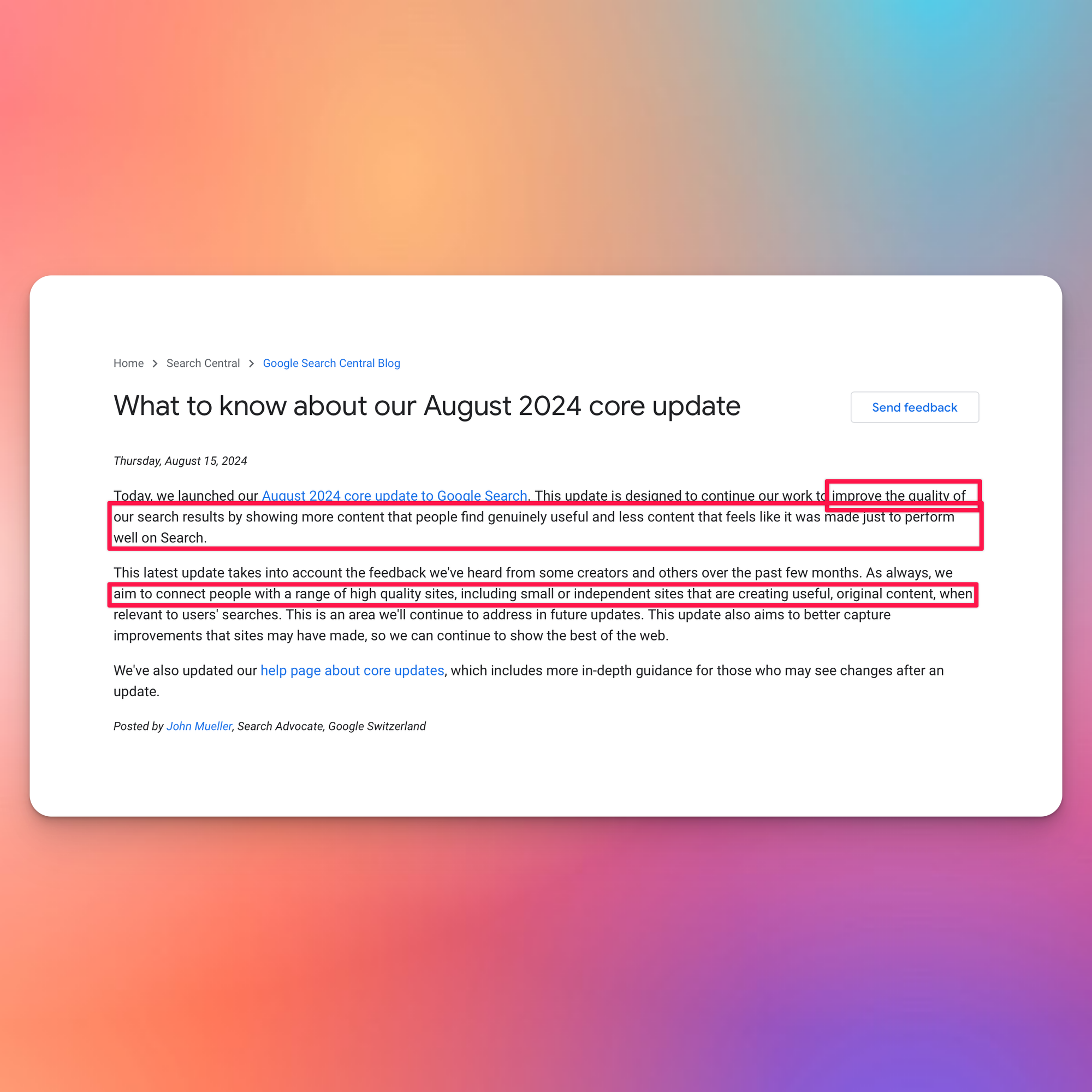The Impact of the August 2024 Google Core Update on Online Recruiting Part 3: - Strategic Meaning
This is part 3 of a three-part blog post about the latest Google Core August 2024 update and its impact on Online Recruiting.
In this post, I will explain why Google made these changes and what the impact will be on the industry.
Why is Google making these changes?
No one knows for sure, but I have two bets. The first is quite realistic; the second is a bit of a long shot. Let’s explore.
Google Core Update August 2024
Google Core updates are changes to how Google ranks websites in search results. They aim to improve the quality and relevance of the information people find. These updates focus on rewarding sites with helpful, trustworthy content and ensuring the best user experience.
According to John Mueller, the search advocate and leading Google spokesperson, this 2024 core update has two goals:

Goal 1: Show more content that people find genuinely helpful and less content that feels like it was made to perform on search
Do you see how showing the job ad from the ATS that matches a branded query can be considered more helpful content in Google’s eyes than sending users to a search result landing page from Indeed?
Part of Indeed’s SEO strategy was creating millions of search queries in long-tail and capturing traffic.
The reality is that a job seeker looking for specific jobs from a company does not have to go to Indeed—they can go to the company's career page because of their clear intent—to apply for a job.
I totally agree with this.
Goal 2: Connect people with a range of high-quality sites, including small and independent sites creating original content
This sentence is targeted more toward the hundreds of high-quality, independent sites that were hit by Google's spam update early this year. However, during my research, I encountered many job ad pages from niche job boards being shown in the top 5 search results. If this trend continues, it can be huge for job boards.
Indeed’s cooperation with AI.
Okay, I am going to start by saying that this is a bit of a conspiracy theory. If you are up for that, continue reading. Otherwise, jump to the summary.
Earlier this year (March), OpenAI quietly published an article on their cooperation with Indeed.
In August, more outlets picked up the news. Indeed issued a press release, and suddenly, it became a big deal.
So, think about that.
For more than a decade, Google has organically sent 200-600 million unique visitors to Indeed every month.
Suddenly, Indeed decided to work with OpenAI and push millions in their direction when they could have just used Google’s models. Is Google punishing Indeed by taking away this sweet, free traffic?
Yeah, I know, it sounds unbelievable.
Summary:
Ok, so what did we learn in almost 2000 words?
As someone who has been working on optimizing job boards SEO for the past 5 years, this is a huge change.
- When there are good enough search results from actual jobs, Google will prioritize these in the organic results, even above Google Jobs.
- The direct job URLs can come both from the ATS but also from niche job boards.
- If there are enough excellent matches from actual jobs, Google will also NOT show the Google Jobs feature. This is still being tested right now, so it might change.
- Google is prioritizing career and ATS pages for branded searches (company + string) and showing these above Google Jobs and search result landing pages from Indeed and LinkedIn.
- Google is showing sitelinks from ATS that can also contain category search result pages and actual job links.
- In some instances, Google Jobs also prioritizes results leading to ATS job pages when they result from a brand search.
- Niche job boards are also prioritized in the search result lists for precise branded searches if they have a relatively good DA.
- Indeed is losing its dominance in generic and precise brand searches, and Google is promoting search result pages from Indeed less often.
The clear winners are ATS platforms and niche job boards with high DA.